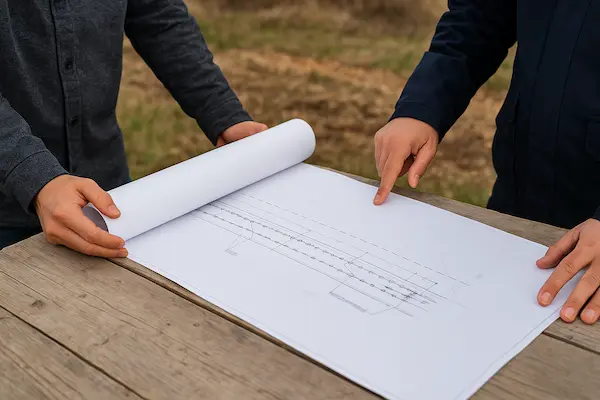HOW TO ESTABLISH A VOLUNTARY EASEMENT

EASEMENTS IN CO-OWNERSHIP SITUATIONS
When the land over which the easement is to be established is owned by multiple individuals, the consent of all co-owners is mandatory. The will of a single owner is not sufficient. This requirement helps prevent future conflicts and ensures that the rights of all titleholders are respected.
A common scenario arises when several siblings inherit a parcel of land without formally dividing it. If one of them wishes to establish a right of way in favor of an adjacent property, they must obtain the consent of all other heirs for the easement to have full legal validity.
LEGAL LIMITS ON EASEMENTS IN CASES OF USUFRUCT
Even if the property owner retains title, the presence of a usufruct—meaning another individual holds the right to use and enjoy the property—introduces additional considerations. The owner may establish a voluntary easement only if it does not infringe on the rights of the usufructuary.
For example, if the usufructuary uses the land for agricultural purposes, an easement cannot be imposed that hinders those activities, such as the installation of permanent structures that occupy cultivation areas.
CONCLUSION
Voluntary easements offer a flexible tool to adapt the use of real property to specific needs, provided the rights of third parties—such as co-owners or usufructuaries—are respected. The validity and enforceability of these easements depend on compliance with formal requirements and respect for the legitimate interests of other parties with rights over the property.
If you are dealing with a matter related to easements, our law firm offers expert legal advice on property rights, including the establishment, regulation, or termination of easements. Contact us today for specialized legal assistance.
Frequently Asked Questions (FAQs)
Can I establish an easement without a contract?
Yes, an easement can also be created through a will, as long as the owner’s intent is respected and third-party rights are not violated.
What happens if one of the co-owners disagrees with the easement?
Without the consent of all co-owners, the easement cannot be legally established.
Can a usufructuary block the creation of an easement?
A usufructuary cannot block the easement if it does not affect their right to use and enjoy the property. However, if it causes harm, the easement cannot be imposed.
Can a voluntary easement be terminated?
Yes, it can be terminated by mutual agreement, by the beneficiary’s waiver, or if its use becomes impossible.
Is it mandatory to register the easement?
While registration is not required for its existence, registering the easement with the Office of Real Rights provides stronger legal protection against third parties.
The content of this article does not reflect the technical opinion of Rigoberto Paredes & Associates and should not be considered a substitute for legal advice. The information presented herein corresponds to the date of publication and may be outdated at the time of reading. Rigoberto Paredes & Associates assumes no responsibility for keeping the information in this article up to date, as legal regulations may change over time.


